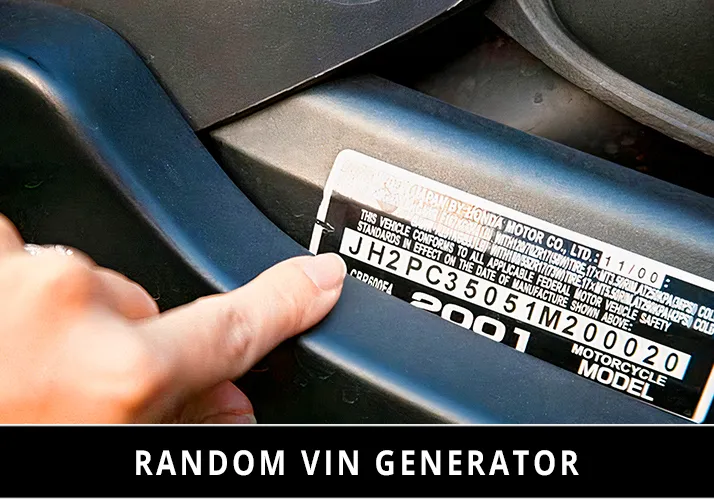Have you ever come across the term random VIN and wondered what it really means? Most car owners and buyers hear about VINs but do not fully understand their importance. A Vehicle Identification Number, or VIN, is like the fingerprint of a car. It is unique, it carries essential information, and it can reveal more about a vehicle than you might expect. But what happens when people mention a random VIN? Let’s explore this concept step by step.
Understanding the Basics of a VIN
Before we dive into the idea of a random VIN, it is important to understand what a VIN is. Every vehicle on the road has a 17-character code made up of letters and numbers. This code is the VIN. It tells you details like the manufacturer, the year of production, the model, and even the plant where it was built.
Think of it as a vehicle’s DNA. No two cars in the world share the same VIN, which makes it a critical tool for registration, insurance, and even resale. Without a VIN, it would be nearly impossible to track or identify cars accurately.
What People Mean by a Random VIN
So, what is a random VIN? In most cases, it refers to a VIN that is generated or used without connection to a specific vehicle. Sometimes websites or apps create random VINs to test systems, run demos, or even generate data for training purposes.
For example, if a company is building a VIN decoder tool, they may use a random VIN just to test whether their program works correctly. On the other hand, car enthusiasts sometimes use random VINs when they want to experiment with decoding without entering their own car’s information.
Why Random VINs Exist
You might be wondering why anyone would need a fake or random VIN in the first place. The truth is that these codes serve many purposes beyond identifying vehicles. Developers, researchers, and even students studying automotive technology need random VINs for practice.
Additionally, random VINs help when companies want to showcase how their tools work without exposing private customer data. Instead of using a real car owner’s VIN, they use a generated one to protect privacy.
How Random VINs Are Generated
The process of generating a VIN might sound complicated, but there is actually a pattern. Real VINs follow strict guidelines set by the International Organization for Standardization (ISO). Each section of the VIN has a specific meaning. For instance, the first three characters reveal the manufacturer, while the last six usually represent the production sequence.
When people talk about random VINs, these codes are often made using algorithms that mimic the structure of a real VIN. This way, the random VIN looks valid but does not actually belong to an existing car.

The Risks of Using Random VINs
While random VINs have legitimate uses, they can also come with risks if misused. Some shady websites or individuals use random VINs to mislead car buyers. Imagine someone trying to sell a stolen vehicle. They might attach a fake VIN to hide its real identity. This practice, known as VIN cloning, can cause serious problems for unsuspecting buyers.
If you are buying a car, it is always wise to check the VIN with trusted sources like government databases or reputable vehicle history services. That way, you can confirm that the car you are purchasing is genuine and has a clean record.
Why Real VINs Matter More
A random VIN can be useful for testing, but when it comes to real-world situations, nothing replaces an authentic VIN. Real VINs are tied to a vehicle’s entire history, including accidents, recalls, ownership records, and mileage.
For example, if you want to buy a used car, entering its VIN into a database can reveal if it has ever been in a major crash or if it has been stolen. This simple step can save you from making an expensive mistake.
How to Spot a Fake or Random VIN
If you are ever in doubt about whether a VIN is real or random, there are a few signs to watch for. First, check the length. Every VIN must be exactly 17 characters long. If it is shorter or longer, it is not valid.
Next, look at the characters themselves. VINs do not use certain letters like I, O, or Q, because they can be confused with numbers. If you see one of these letters, it is probably a fake. Finally, running the VIN through an online decoder or official registry can quickly confirm whether it belongs to a real car.
The Role of Random VINs in Technology
Interestingly, random VINs play a bigger role in technology than most people realize. Software companies working on car-related applications often need large sets of VINs to test their systems. Using real VINs could expose personal information, so random VINs provide a safe alternative.
This practice ensures that programs like insurance calculators, car history checkers, and DMV systems run smoothly without risking sensitive data. In this sense, random VINs actually contribute to safer digital tools for car owners.
Real-Life Scenarios Where Random VINs Are Useful
Let’s imagine a few situations. Suppose you are a developer building a website where users can check their car’s recall status. You cannot test the site with your own VIN over and over again. Instead, you create random VINs to see how your system responds.
Or consider an auto repair training school. Students learning about VIN decoding might need practice. Instead of accessing real vehicles, they can work with random VINs to gain confidence before handling actual cases.
These examples show that random VINs are not just about numbers. They are practical tools for education, research, and innovation.
Why Car Buyers Should Stay Alert
Even though random VINs serve useful purposes, car buyers should always stay alert. Scammers know that most people do not fully understand VINs, which makes them an easy target. If someone tries to sell you a car with a suspicious VIN, that should be a major red flag.
Always double-check the VIN on the car itself with the number on its documents. If they do not match, walk away. It is better to be safe than to deal with the headache of owning a stolen or misrepresented vehicle.
Final Thoughts on Random VINs
At first, the idea of a random VIN may sound confusing. However, once you understand its purpose, it becomes clear that these codes are not always bad. They serve as useful tools for developers, researchers, and educators. At the same time, they can also pose risks if used dishonestly.
The key is knowing the difference between when a random VIN is harmless and when it is a warning sign. For everyday car owners, the most important thing is to check and verify VINs before making big decisions like buying a vehicle.
Conclusion
So, the next time you hear the term random VIN, you will know that it is not just a string of letters and numbers. It can be a valuable tool for learning and testing, but it can also be misused if you are not careful. By understanding how VINs work, you can protect yourself while also appreciating the role that random VINs play in the bigger automotive world.
Would you like me to also make this article SEO-friendly with keyword placement (like “VIN number check,” “fake VIN risks,” and “VIN decoder tools”) so it can rank better on search engines?


